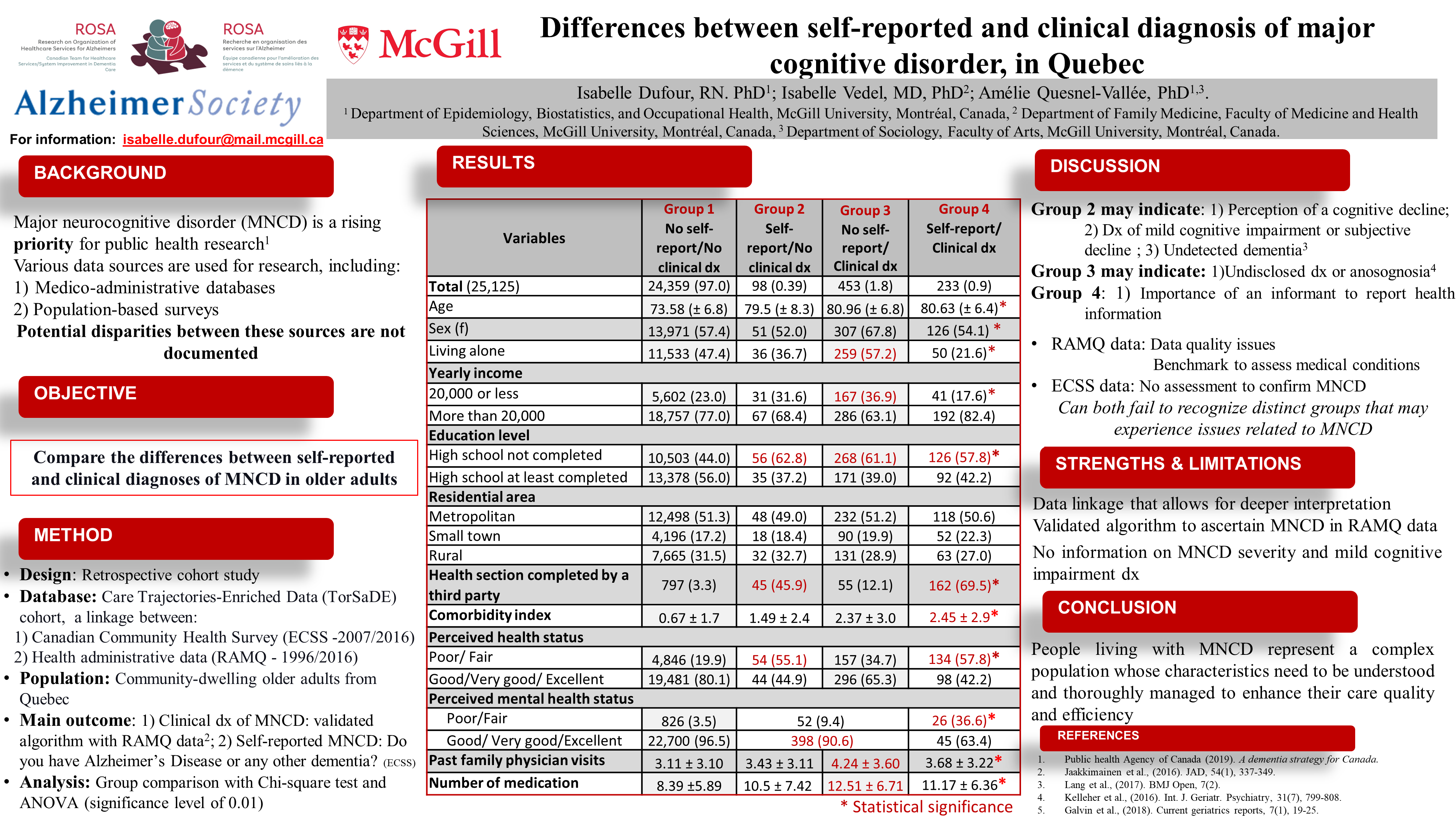SRFP029: Differences between self-reported and clinical diagnosis of dementia among older adults in Quebec
Isabelle Dufour, PhD, RN; Isabelle Vedel, MD, PhD; Amelie Quesnel-Vallee
Abstract
Context. Because of its high prevalence and impacts, dementia has risen as a priority for public health research. Various data sources are used to conduct dementia research. Population-based surveys provide essential information (e.g., quality of life) and allow multiple group comparisons. One of the data collection challenges is the accuracy of self-reported conditions. Indeed, dementia self-report may be biased for various reasons, including variations in individuals' awareness and recognition of the disease. Thus, characterizing the variation between self-reported dementia and clinical diagnosis is essential for proper information use.
Objective. We aim to compare differences between self-reported and clinical diagnoses of dementia in older adults.
Study design. Retrospective cohort study.
Dataset. Data from the Care Trajectories-Enriched Data (TorSaDE) cohort, a linkage between two complementary sources: four cycles of the Canadian Community Health Survey (CCHS) between 2007 and 2014, and health administrative data from the provincial health-insurance board (Régie de l'assurance maladie du Québec: RAMQ) between 1996 and 2016.
Population studied. Community-dwelling individuals of 65 years and older from the Quebec Province (Canada) who participated in one of the CCHS cycles.
Outcome measure. We identified the clinical diagnosis of dementia with the RAMQ data before the CCHS completion, using a validated algorithm based on hospitalizations, physician visits, and pharmaceutical services records. We identified self-reported dementia using the answer to a CCHS question: Do you have Alzheimer's Disease or any other dementia? (Yes/No). The cohort was divided into four groups according to self-reported (Yes/No) and clinical diagnosis of dementia (Yes/No). First, we compiled and compared groups characteristics (using Anova and chi-square test) with variables such as socioeconomic characteristics and perceived health. We then descriptively compared self-reported and clinical diagnoses of dementia.
Anticipated Results. The study cohort was composed of about 25,000 older adults: around 300 self-reported dementia and about 700 had a clinical diagnosis. The data showed discordance for about 560 individuals. Analyses are presently in progress, and results will be presented at the NAPCRG 2021.
Conclusions. This study will reveal the characteristics of those misreporting their cognitive condition, thus enhancing our understanding of their profiles and needs.
Objective. We aim to compare differences between self-reported and clinical diagnoses of dementia in older adults.
Study design. Retrospective cohort study.
Dataset. Data from the Care Trajectories-Enriched Data (TorSaDE) cohort, a linkage between two complementary sources: four cycles of the Canadian Community Health Survey (CCHS) between 2007 and 2014, and health administrative data from the provincial health-insurance board (Régie de l'assurance maladie du Québec: RAMQ) between 1996 and 2016.
Population studied. Community-dwelling individuals of 65 years and older from the Quebec Province (Canada) who participated in one of the CCHS cycles.
Outcome measure. We identified the clinical diagnosis of dementia with the RAMQ data before the CCHS completion, using a validated algorithm based on hospitalizations, physician visits, and pharmaceutical services records. We identified self-reported dementia using the answer to a CCHS question: Do you have Alzheimer's Disease or any other dementia? (Yes/No). The cohort was divided into four groups according to self-reported (Yes/No) and clinical diagnosis of dementia (Yes/No). First, we compiled and compared groups characteristics (using Anova and chi-square test) with variables such as socioeconomic characteristics and perceived health. We then descriptively compared self-reported and clinical diagnoses of dementia.
Anticipated Results. The study cohort was composed of about 25,000 older adults: around 300 self-reported dementia and about 700 had a clinical diagnosis. The data showed discordance for about 560 individuals. Analyses are presently in progress, and results will be presented at the NAPCRG 2021.
Conclusions. This study will reveal the characteristics of those misreporting their cognitive condition, thus enhancing our understanding of their profiles and needs.

Jack Westfall
jwestfall@aafp.org 11/21/2021Very interesting research. Great work. Thanks